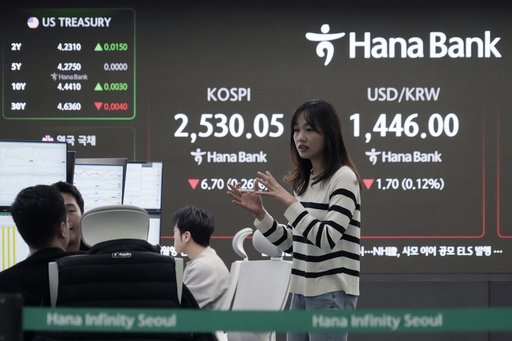NEW YORK — U.S. stock markets faced declines on Friday, prompted by growing concerns over rising inflation and potential tariffs, with key employment data painting an ambiguous picture of the nation’s job landscape.
The S&P 500 dropped by 0.9%, putting it on course to eliminate prior week’s gains, while the Dow Jones Industrial Average fell by 440 points, equivalent to a 1% decrease. A significant downturn in Amazon’s shares following its latest earnings announcement contributed to a leading loss of 1.4% for the Nasdaq composite index.
In the bond market, Treasury yields increased after a discouraging report indicated a surprising dip in consumer sentiment among U.S. residents. The preliminary findings from the University of Michigan suggested that consumers anticipate inflation to rise to 4.3% in the upcoming year—the highest prediction since 2023. This expectation marks a notable increase of one percentage point from the previous month and is the second consecutive month in which a significant uptick in consumer inflation forecasts occurred. Economists have pointed to the potential for U.S. tariffs on various imported goods proposed by President Donald Trump, which could ultimately raise consumer prices.
Trump mentioned on Friday that an announcement regarding “reciprocal tariffs” is expected on Monday or Tuesday, emphasizing a system where tariffs are aligned based on each country’s pricing strategies. This sentiment report was backed by mixed results from the U.S. job market, indicating that while hiring levels in the last month fell below half of December’s figures, the unemployment rate decreased and wage increases for workers outpaced economists’ predictions.
Collectively, the latest data could influence the Federal Reserve’s stance on interest rates. The Fed initiated cuts to its key interest rate in September with the aim of easing economic pressures, yet it cautioned towards the end of the year that it might implement fewer reductions in 2025 due to persistent inflation concerns. Interest rates significantly impact Wall Street, as lower rates can boost stock and investment prices, but they can also intensify inflation.
According to Scott Wren, a senior strategist at Wells Fargo Investment Institute, the jobs report has not altered his outlook, predicting a singular cut to the federal funds rate in 2025, which is more conservative than the market consensus. Traders on Wall Street foresee around a 45% likelihood of at least two rate cuts, although some are betting on the possibility of no reductions at all. Wren expressed that market volatility may persist due to uncertainties regarding interest rates as well as Trump’s tariffs and other global unpredictabilities.
Following earlier volatility, concerns about a potential global trade war have somewhat abated after Trump granted a 30-day reprieve on tariffs for both Mexico and Canada. However, Bank of America economists warn that Europe could be the next target for tariffs, suggesting that uncertainty may hinder international investment, even if outcomes are ultimately favorable.
Meanwhile, shares of major U.S. companies continue to fluctuate with quarterly earnings released for the last part of 2024. Many entities are reporting better-than-expected financial results, though this often proves insufficient to maintain stock prices. Amazon exceeded anticipated earnings for the end of 2024, yet its shares plummeted by 4% as investors focused on a revenue forecast that fell short of expectations.
Homebuilder stocks also suffered losses, as expectations for fewer interest rate cuts from the Fed could keep mortgage rates elevated. D.R. Horton saw a 5.6% decrease, while Lennar dropped by 3.8%. On a positive note, Expedia Group’s shares surged 16.7% after announcing stronger-than-anticipated profits for the last quarter of 2024. CEO Ariane Gorin highlighted that demand for travel exceeded forecasts, and the company announced a return to dividends for investors after suspending them in 2020 due to the pandemic’s impact on travel.
Take-Two Interactive Software also enjoyed an increase, climbing 15.5% after surpassing profit expectations, with CEO Strauss Zelnick attributing success to the NBA 2K franchise. The company reassured investors about the anticipated release of its latest Grand Theft Auto title in the upcoming fall, assuaging concerns regarding potential delays.
In the bond market, the 10-year Treasury yield rose to 4.48%, up from 4.44%, while the two-year Treasury yield increased to 4.27%, compared to 4.22%. Economists worry that consumer expectations of high inflation may prompt households to act preemptively by making purchases, potentially triggering a self-fulfilling inflation cycle.
Globally, stock indices saw modest declines in Europe following a mixed performance in Asian markets.
